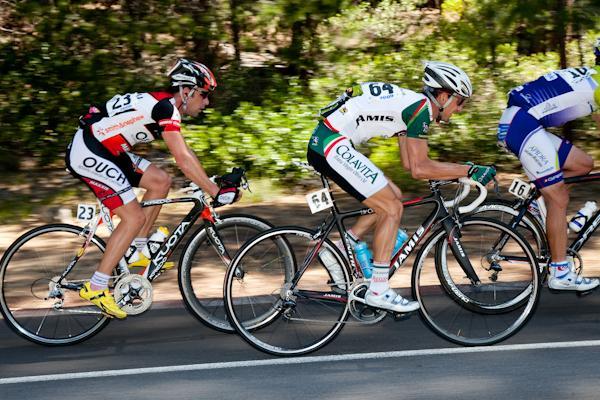Proposed UCI radio ban could include US elite events
Continental teams prepare as USAC seeks clarification

United States of America-based Continental teams are preparing for the International Cycling Union’s (UCI) proposed radio ban to cross over to American shores in 2010. The radio ban is thought to extend to Elite men and women in all Elite Class 2 events of the UCI’s international calendar, events on the national calendar, as well as the UCI World Road Championships to be held in Melbourne, Australia.
The UCI informed national federations this week that the removal of radios in national calendar events has started. USA Cycling could not confirm whether or not radios would banned in all national races in the USA when approached by Cyclingnews.
US-based teams are already thinking about the possible change, preparing new tactical strategies should the UCI ban radios across the country.
Jamis-Sutter Home presented by Colavita directeur sportif Sebastian Alexandre has extensive experience using radios himself, first as a professional road racer followed by a three-year term directing the US-based professional men’s team. Alexandre shared his thoughts on the possible ban when asked if he agreed with or opposed such a change to regulations.
“I think smart riders will take advantage of this ban at some point and I really like this part. This is probably the most exciting element of this, in my opinion,” he said. “The role of captain will be more important, that’s for sure. When it is critical to make decisions on the bike, there is always someone who needs to make that quick call, and it’s not always possibility to come to the car to talk.”
Criteriums are the most typical form of racing in the USA. Alexandre considers radio use far less important during criteriums than during lengthy stage races like the Redlands Bicycle Classic, Cascade Classic and Tour of Utah.
“I don’t think it would change anything during the crits,” said Alexandre. “On the road, it would take longer to follow instructions and yes, the riders will need to pay more attention during the race. The directeur sportif would not be able to tell them what’s happening.”
Get The Leadout Newsletter
The latest race content, interviews, features, reviews and expert buying guides, direct to your inbox!
Communication on the road can already be a difficult task with the increased number of foreign riders competing on US-based Continental teams. Jamis-Sutter Home has a mix of Spanish and English speaking riders. Radios helped break language barriers by making it easy for directeur sportifs to make quick translations amongst the entire team while racing. Still Alexandre does not anticipate a problem between a lack of radios and communicating between languages on his team.
“In my team most of the riders understand each other on the bike now, so I don’t foresee a problem,” Alexandre said. “Three quarters of my riders speak both languages now, so if necessary they can help each other.”
The UCI first introduced the radio ban in the junior and under-23 categories. Radio removal hit the ProTour during stages 10 and 13 at the Tour de France, provoking uproar amongst competing teams and riders alike. Johan Bruyneel, at the time Astana’s team director, led a movement to have race radios restored whereby 14 teams were said to have signed. Radios were reinstated for the second of the two stages after the peloton protested by riding the first test stage at a reduced pace.
“I definitely like the idea of not having radios on juniors and under-23,” Alexandre said. “I believe that young riders need to earn experience and learn by the mistakes they do. But I think the radios are not such a big deal for pro teams.
“Most riders should be experienced by the time they turn pro,” he continued. “So as a directeur sportif you will not change their mind or mentality. You can tell them what you want them to do, and make quick communications with the radio. It will just take longer for a rider to go to the team car for instructions. At the end of the day they will follow instructions of the directeur sportifs or the captains.”
Reactions to the proposed race radio ban at the national level seem watered down compared to the heightened controversy held at the Tour. American professional Tim Johnson is well-known as the on-road captain of the Ouch-Maxxis team in 2009. He is looking forward to the change and noted that a lack of radios might create opportunities for many riders on the team.
“I think it’s awesome and I’m all for it,” Johnson said. “I was shocked that it was going to happen at all, especially at the Tour level. But with Healthnet we raced to dominate and we always followed a script. The type of racing is going to change a little bit. It would create more opportunities and winning scenarios for all riders on the team.”
Johnson noted that without radios, rider would need to improve their tactical smarts to make in-the-moment decisions during constantly changing race situations. “Bike racing is a lot more than just fitness or capability as an athlete,” Johnson said. “This would make being race savvy and having different skills sets more valuable. It will be a lot better like that.
“I think it would put a lot of pressure on having more preparation going into a race,” he continued. “The team meetings would have to include more of the potentials, the ‘what happens if this’ or ‘what happens if that’ type of situations. Having a clear understanding on how a race will transpire is key.”
Johnson believes that without radios the role of on-road captain would be lessened and that the decision making responsibility would rest on the shoulders of the entire team. “The captain was the person that communicated between the directeur in the car and the riders,” Johnson said. “But there would be more accountability and savvier racing by every member of the team. The depth of the team would be more of an asset than ever.”
Skepticism still remains regarding race radio bans with respect to riders going uninformed about potential on-road dangers that could arise while racing.
Follow Cyclingnews on Twitter for the very latest coverage of events taking place in the cycling world - twitter.com/cyclingnewsfeed
The 2009 Cyclingnews reader poll

You can still enter the 2009 Cyclingnews reader poll and vote for your riders, teams, races, moments, equipment and photos of the year.
One lucky reader will win an Argon18 Krypton bike so get your entries in before the closing date - December 31, 2009.

Kirsten Frattini is the Deputy Editor of Cyclingnews, overseeing the global racing content plan.
Kirsten has a background in Kinesiology and Health Science. She has been involved in cycling from the community and grassroots level to professional cycling's biggest races, reporting on the WorldTour, Spring Classics, Tours de France, World Championships and Olympic Games.
She began her sports journalism career with Cyclingnews as a North American Correspondent in 2006. In 2018, Kirsten became Women's Editor – overseeing the content strategy, race coverage and growth of women's professional cycling – before becoming Deputy Editor in 2023.